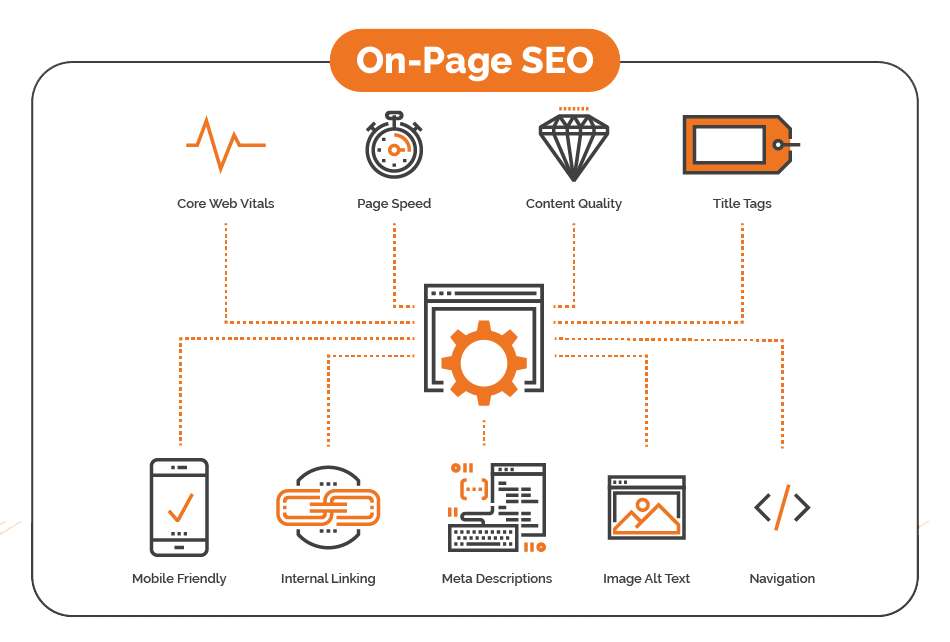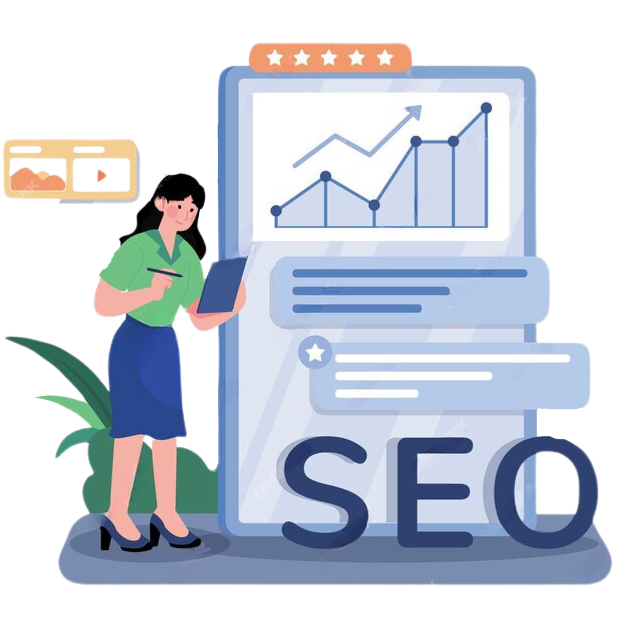Benefits of SEO for Online Stores – Table of Contents
Introduction
eCommerce SEO is a goldmine for online stores. Despite the fact that SEO has one of the highest ROI of any eCommerce marketing campaign, many online stores are put together with little to no consideration of organic traffic. Instead, many rely on social media or paid ads, which can be great but typically require constant effort and a steady stream of income. Ad spending costs companies billions of dollars every year — an amount that is only increasing.
On the other hand, search engine optimization primarily requires effort upfront. Once you rank, you can practically make sales on autopilot with no recurring expense. With this in mind, understanding SEO best practices can help boost your eCommerce business.
Benefits Of SEO for Online Stores
- More Visibility: Make your website easier to find in search results, leading to more visits and sales.
- Attract the Right Customers :Use specific keywords to draw in visitors who are looking for what you offer, increasing the chance they will buy from you.
- Cost-Effective: SEO is cheaper than traditional advertising and has lower ongoing costs.
- Stay Competitive: Beat your competitors in search results to get more attention from potential customers.
- Build Trust: Higher search rankings make customers trust your site more, leading them to choose your products or services.
- Better User Experience: An easy-to-use website with clear content helps visitors navigate and improves their experience.
- Mobile-Friendly: Make sure your site works well on phones to reach more people and provide a smooth experience.
- Local Presence: Use local SEO to show up in searches by nearby customers, bringing them to your physical store.
- Get Insights: SEO tools give you useful information about customer behavior, helping you make better decisions.
- Adapt to Changes: Keep your SEO up-to-date to adapt to market changes, customer needs, and search engine updates.
- Global Reach: SEO helps you reach customers worldwide, expanding your business beyond your local area.
- Better Credibility: A well-maintained site with good content and social media presence builds trust with customers.
- Helps in Ranking Your Website: SEO improves your website’s position in search results, attracting more visitors without paying for ads.
- Brings Organic Traffic to Your Business: SEO uses relevant keywords to attract real visitors, helping your site rank higher and grow your audience naturally.
- Increase Conversion Rates: Effective SEO strategies enhance user experience and target the right audience, leading to higher conversion rates and more sales
Is SEO Important For Ecommerce?
Yes, SEO (Search Engine Optimization) is important for e-commerce. Here’s why you should invest in SEO services for ecommerce:- Increases Visibility: Helps your site rank higher in search results, driving more visitors to your site.
- Cost-Effective: Cheaper than paid ads in the long run and provides lasting benefits.
- Better User Experience: Improves site structure and loading speed, making it easier for customers to navigate.
- Builds Trust: Higher search rankings can make your site seem more credible.
- Targets the Right Audience: Helps attract visitors who are specifically looking for products you sell.
- Gives Competitive Edge: Helps you stay ahead of competitors who aren’t using SEO effectively.
On-Page SEO Strategy

What is On-Page SEO?
On-page SEO involves optimizing individual pages on your website to rank higher in search engines. This is achieved by placing the right keywords in the right places, helping search engines understand what your page is about.
Why is it Important?
Effective on-page SEO not only helps your site rank better but also ensures you appear in various Search Engine Results Page (SERP) features, increasing your visibility.
Key Elements of On-Page SEO
1. Keyword Research
Keyword research is the critical first step in an eCommerce SEO campaign. If you get this part wrong, one of two things will happen:
- You’ll target keywords too difficult to rank for and won’t make it to page one.
- You’ll rank for keywords that don’t garner traffic or cause customers to buy.
Neither of these situations is ideal, which is why eCommerce keyword research is so important. It will ensure you target keywords that are easy to rank for, have decent search volume, and high conversion rates. However, there is more to choosing keywords than simply looking at how difficult it is to rank or how many people search for them. Here are some tips to help you perform eCommerce keyword research:
- Determine if you are choosing the right keywords: Use tools like Google Keyword Planner to find rough search volume and CPC to determine buyer intent. Tools like Ahrefs can provide keyword difficulty (KD) and search volume data to make informed decisions.
- Use Amazon for keyword research: Amazon is a gold mine of high buyer intent keywords. Start typing in your seed keyword, and Amazon will suggest autofill keywords. These are valuable keyword ideas you can use.
- Find keywords through competitor research: Analyze your competitors’ websites to see which keywords they rank for. Use tools like Ahrefs to get insights into their keyword strategies.
- Create a keyword matrix: Organize your keywords in a spreadsheet to quickly determine the best keywords to use on each of your pages based on KD, search volume, and search intent.
2.Optimizing Product Pages
Product and category pages are arguably the most important pages to rank. If someone finds them in Google, they immediately have access to all your products in that category. To properly optimize these pages, place your target keyword in the following places:
- In the URL: Including your primary keyword in the URL is a simple yet effective way to improve search rankings.
- In the title tag (H1): The page title tag should have the keyword as close to the beginning as possible.
- In body copy: Aim for at least a 300-word introduction with your keyword included 2-3 times.
- In image alt text: Alt text helps search engines understand what the image is about and can improve your chances of showing up in Google image results.
- In the metadata: While including your keyword in your metadata hasn’t been shown to impact rankings directly, it can improve click-through rate (CTR), which can positively affect rankings.
3.Content Marketing
Content is an increasingly important part of a modern marketing strategy. Quality content can significantly boost your SEO. Consider the following points:
- Expand keyword coverage: Product and category pages can only rank for so many keywords. Content marketing helps you rank for both short and long-tail keywords related to your industry.
- Build backlinks: Quality content attracts backlinks, which improve your domain authority and rankings.
- Increase traffic and sales: More quality content means more traffic, which can lead to increased sales.
Technical SEO Clean-Up
Technical SEO is all about ensuring your website is optimized for the crawling and indexing phase. By focusing on the technical aspects of your site, you can ensure that search engines can easily access, crawl, interpret, and index your website without any issues. Here are the crucial elements of technical SEO clean-up:
1. Website Architecture
Ecommerce site architecture, or structure, is how you set up your navigation, category pages, and product pages. Good site architecture makes it easier for search engines and users to navigate. Follow these golden rules:
- Make it Simple and Scalable: Ensure your site structure is straightforward and can grow with your business. A well-organized site architecture is easy for users to navigate and search engines to crawl.
- No Page Should Take More Than Three Clicks from Any Other Page: This rule helps in creating a user-friendly and search engine-friendly site structure. The fewer clicks it takes to reach a page, the better.
 Example of Good
Site Architecture:
A well-structured online store should have the homepage link to all major category pages and some of the
best product pages. This ensures those pages get the most authority from the homepage and have a better
chance of ranking highly in search.
Example of Good
Site Architecture:
A well-structured online store should have the homepage link to all major category pages and some of the
best product pages. This ensures those pages get the most authority from the homepage and have a better
chance of ranking highly in search.
2. Page Speed
Site speed is crucial for both rankings and user experience. According to a study from Radware, 51 percent of online shoppers in the U.S claimed if a site is too slow, they will not complete a purchase. To improve your site’s speed:
- Use Google’s PageSpeed Insights: This tool helps identify issues that slow down your site. Google will score you on Mobile and Desktop from 1 to 100 and provide steps to speed up your load times.
- Optimize Images: Ensure images are compressed and properly sized.
- Minimize HTTP Requests: Reduce the number of elements on your page to decrease load time.
- Enable Browser Caching: This allows returning visitors to load your pages faster.
3. Redirects
Redirects send users and search engines to a different URL from the one originally requested. Properly managing redirects ensures you maintain SEO rankings. Here are the key points to consider:
- 301 Redirects: Use 301 redirects for permanently moved pages. This tells search engines that the page has moved permanently and transfers most of the SEO value to the new URL.
- 302 Redirects: Use 302 redirects for temporarily moved pages. This indicates that the move is temporary and does not transfer SEO value.
- Avoid Redirect Chains: Ensure there are no multiple redirects before reaching the final URL as it can slow down your site and impact SEO negatively.
4. Internal Linking
Internal linking helps distribute page authority and improve navigation. They guide users from one page to another, increasing engagement and conversions. Effective internal linking involves:
- Linking to Related Content: Ensure your internal links guide users to related content.
- Using Descriptive Anchor Text: Use clear and descriptive anchor text that indicates what the linked page is about.
- Ensuring a Logical Flow: Create a logical flow of content that makes sense to the user.
5. HTTPS and Mobile Responsiveness
Secure your site with HTTPS and ensure it’s mobile-friendly. With more than half of all Google searches happening on mobile devices, mobile responsiveness is critical for SEO success. Key considerations include:
- HTTPS: Ensure all pages on your site are served over HTTPS to protect user data and improve trust.
- Mobile-Friendly Design: Use responsive design to ensure your site works well on all devices. Google’s Mobile-Friendly Test can help you identify issues.
6. Duplicate Content
Google penalizes sites with duplicate content. Ensure your content is unique and offers value to your users. To avoid duplicate content issues:
- Use Canonical Tags: Canonical tags help indicate the preferred version of a page when there are multiple pages with similar content.
- Avoid Duplicate Meta Descriptions: Ensure each page has a unique meta description.
7. Hreflang and Canonicals
- Hreflang: Use hreflang to identify the language and geographical targeting of a webpage, especially if you have multiple versions of the same page in different languages. This helps search engines serve the correct version to users based on their location and language preferences.
- Canonicals: Canonical tags help tell Google which version of a URL you want to appear in search results, avoiding duplicate content issues. This is especially useful when you have similar content spread across multiple URLs.
8. Sitemap
A sitemap is a file that provides information about pages, videos, or other files on your site. It helps search engines crawl your site more efficiently. Key points to consider:
- Include Important Pages: Ensure all important pages are included in your sitemap.
- Update Regularly: Keep your sitemap updated as you add or remove pages.
- Submit to Search Engines: Submit your sitemap to Google Search Console and Bing Webmaster Tools to help search engines discover your pages.
Link Building Strategies
Link building is an essential part of SEO. It involves acquiring backlinks from other websites to your own. Backlinks from high-authority websites can significantly improve your site’s rankings. Here are some effective link-building strategies:
1. Resource Pages
Resource pages are collections of links to valuable resources related to your industry. Getting your site listed on these pages can boost your authority and rankings. To find resource pages:
- Search for Resource Pages: Use Google to find resource pages relevant to your niche by searching for “inurl + [your keyword]”.
- Reach Out to Site Owners: Contact the site owners and request them to include your site as a resource.
2. Influencer Partnerships
Collaborate with influencers in your industry to get backlinks from their high-authority sites. This not only improves your SEO but also exposes your brand to a wider audience. Steps to follow:
- Identify Relevant Influencers: Look for influencers who have a large following and high domain authority.
- Build Relationships: Engage with them on social media, comment on their blog posts, and share their content.
- Request Backlinks: Once you’ve built a relationship, request them to link to your site in their blog posts or other content.
3. Broken Link Building
Identify broken links on other websites and offer your content as a replacement. This is a great way to earn high-quality backlinks. Here’s how to do it:
- Find Broken Links: Use tools like Ahrefs or Check My Links to find broken links on relevant websites.
- Contact Site Owners: Reach out to the site owners and inform them about the broken link. Suggest your content as a replacement.
4. Competitor Analysis
Analyze your competitors’ backlinks using tools like Ahrefs. Identify opportunities to get similar backlinks to boost your rankings. Steps to follow:
- Identify Competitors: Find out who your main competitors are in search results.
- Analyze Backlinks: Use Ahrefs to see where their backlinks are coming from.
- Reach Out: Contact the sites linking to your competitors and request backlinks to your own site.
5. Guest Posting
Write guest posts for reputable blogs in your industry. This not only earns you backlinks but also builds relationships with industry experts. To start guest posting:
- Identify Target Blogs: Find blogs in your niche that accept guest posts.
- Pitch Your Ideas: Reach out to the blog owners with unique and relevant post ideas.
- Write High-Quality Content: Ensure your guest posts are well-researched and provide value to the readers.
Ecommerce SEO Tools
- SEMrush
SEMrush is excellent for ecommerce SEO because it provides comprehensive keyword research, competitor analysis, and site audits. It also includes specific features like product listing optimization, which is highly beneficial for ecommerce businesses. - Moz Pro
Moz Pro offers ecommerce-specific SEO tools like keyword research, rank tracking, and site audits. It helps in identifying and fixing technical SEO issues that can impact your online store’s visibility. - Screaming Frog SEO Spider
This tool is great for auditing ecommerce websites with many pages. Screaming Frog can identify issues like broken links, duplicate content, and missing meta tags, which are crucial for maintaining a healthy ecommerce site. - Google Search Console
Google Search Console is essential for tracking how your ecommerce site is performing in Google search. It provides data on search traffic, indexing issues, and insights into how Google perceives your website, helping you identify areas for improvement. - Ahrefs
Ahrefs is valuable for ecommerce stores because it provides deep insights into backlinks, competitor analysis, and keyword rankings. It’s particularly useful for understanding the backlink profile of competitors and finding link-building opportunities specific to your niche. - Yoast SEO (for WordPress-based stores)
If your ecommerce store is on WordPress, Yoast SEO helps with on-page SEO, including optimizing product pages, meta tags, and content structure, making it easier for search engines to crawl and index your site. - Plug In SEO (for Shopify stores)
Plug In SEO is a popular SEO tool for Shopify stores, providing on-page SEO checks, SEO audits, and suggestions for improving meta tags, headings, and content to enhance search visibility.
eCommerce SEO Statistics
- 23.6% of ecommerce orders are directly linked to organic traffic
- 44% of people start their online shopping with a search engine.
- On average, the first result in Google SERP has 3.8 times more backlinks than the rest (2–10).
- 75% of people never scroll past the first page of search engines.
- 95% of search traffic goes to the first page of search results.
- 70% of searches use more than three words.
- 33% of small-to-midsize businesses have optimized websites.
- 61% of Google searches are done via mobile devices.
- At least 43% of all the ecommerce traffic comes from Google’s organic traffic.
- Moving up 1 search engine results page (SERP) will boost your click-through rate by an average of 30.8%.
- On-page content, such as your blog, can increase traffic by as much as 2000%, which can directly impact your SEO ranking.
- On average, the first result on Google contains 1890 words.
- Brand websites containing blogs have 97% more internal links that ultimately boost your SEO performance.
- Approximately 25% of Google searches contain a minimum of one video each.
- Search engines generate 300% more traffic for websites than social media.
- 14.6% of SEO-generated leads are converted into sales.
- Video content is 50 times more likely to drive organic search results than plain text.
- Updating existing content with fresh images and written content can increase organic traffic by 111.3%.
- 43% of all ecommerce traffic comes from organic Google search results.
- Google Images, Google Maps, and Google search account for at least 92.96% of the global organic traffic.
Final Words
eCommerce SEO requires effort upfront but offers long-term benefits. By following best practices in on-page SEO, cleaning up technical issues, building quality links, and regularly measuring your progress, you can transform your eCommerce site into a high-ranking, traffic-driving powerhouse. SEO is a continuous process that evolves with search engine algorithms and market trends. Stay updated, keep refining your strategies, and watch your online store thrive
Read More
- Follow this Complete SEO Checklist to Boost Your eCommerce Store
- Learn How to Build an SEO-Optimized eCommerce Website
- Enhance Your SEO with Smart Social Media Marketing Strategies
- Discover Proven Ways to Increase Your eCommerce Sales
- Master the Go-to-Market Strategy for Your eCommerce Success
- Step-by-Step Guide to Start Your Own eCommerce Business
- Find the Best eCommerce Platforms for Your Business
- Understand the Dropshipping Business Model and Its Benefits
- Explore Different eCommerce Business Models for Success
- Why a Good Website Title Is Crucial for SEO
Ecommerce SEO FAQ
Why invest in SEO services for ecommerce?
Investing in SEO services for ecommerce is essential because it improves your website’s visibility in search engines, drives targeted traffic, and enhances user experience. SEO helps build brand authority, increases conversions, and provides a cost-effective way to attract potential customers compared to paid advertising.
How can I measure the success of my ecommerce SEO efforts?
Measuring SEO success involves tracking organic traffic, monitoring keyword rankings, analyzing engagement metrics like bounce rate and session duration, and measuring conversion rates from organic search. Tools like Ahrefs and Google Analytics provide valuable insights into these metrics.
What are the best SEO tools for ecommerce websites?
The best SEO tools for ecommerce websites include Ahrefs, SEMrush, Moz Pro, Screaming Frog, and Google Search Console. These tools help with keyword research, site audits, rank tracking, and competitor analysis, making them essential for optimizing your ecommerce site.
Does Fathershops provide SEO services for my ecommerce store?
Yes, Fathershops offers SEO services tailored to your ecommerce needs. Their team can help optimize your online store for search engines, improving your rankings, visibility, and overall performance in search results.
Is SEO worth it on Fathershops?
Absolutely! Investing in SEO on Fathershops can significantly boost your store’s visibility, attract more organic traffic, and increase sales. By optimizing your store for search engines, you create a better user experience and drive long-term growth for your business.



 Comprehensive Keyword Research
Comprehensive Keyword Research





